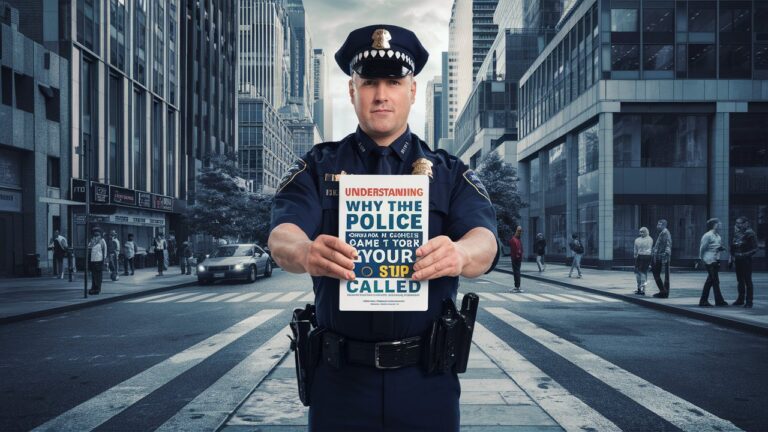Introduction
The unexpected arrival of the police at your doorstep can be alarming, especially if you did not request their presence. The phrase “evime polis geldi ama ben çağırmadım” (“The police came to my house, but I didn’t call them”) reflects confusion, fear, and a desire for clarity. This article explores the potential reasons behind unrequested police visits, your legal rights, steps to navigate the situation, Without Being Called and ways to address lingering concerns. By understanding the process and your role in it, you can respond calmly and protect your interests.
1. Possible Reasons for an Unrequested Police Visit
Police may arrive at your home unannounced for various reasons, even if you did not contact them. One common explanation is a mistaken identity or address. Law enforcement might act on incorrect information, such as a typo in a warrant or an outdated database entry. Another possibility is an anonymous tip or community report. Neighbors or bystanders may have reported suspicious activity, noise complaints, or concerns for welfare, prompting police to investigate. Additionally, officers could be following up on ongoing investigations linked to prior incidents, such as a nearby crime, or tracing connections to individuals under surveillance. Understanding these scenarios helps demystify the situation and reduces panic.
2. Your Legal Rights During a Police Visit
Knowing your rights is critical when interacting with law enforcement. In many jurisdictions, police cannot enter your home without a warrant, unless there are exigent circumstances (e.g., immediate danger or evidence destruction). Politely ask if they have a warrant and verify its authenticity. You have the right to remain silent and avoid self-incrimination. While cooperation is advisable, you are not obligated to answer questions without legal counsel. If the visit stems from a misunderstanding, calmly explain your perspective and provide identification if requested. Documenting the interaction, including officers’ names and badge numbers, can be useful for follow-up.
3. Steps to Take During and After the Police Interaction
If the police arrive unexpectedly, stay calm and composed. Avoid confrontational behavior, as hostility may escalate tensions. Step outside to speak with them if you prefer not to invite them in. If they insist on entering, reiterate your request to see a warrant. After the visit, document every detail: note the time, officers’ remarks, and any actions taken. Contact a lawyer to review the incident, especially if you believe your rights were violated. File a formal complaint with the police department if necessary, and follow up to ensure the matter is resolved.
4. Preventing Future Unwanted Police Visits
To minimize the risk of repeat incidents, address the root cause. If the visit resulted from a mistaken report or identity, request a correction in police records. Strengthen communication with neighbors to prevent misunderstandings—for example, inform them of planned activities that might seem unusual (e.g., late-night moving). Install security cameras to Without Being Called provide evidence in case of false allegations. Consult a legal professional to review your rights and preemptively resolve any administrative errors.
5. Addressing Emotional and Practical Concerns
Unrequested police visits can leave lasting anxiety. Speak to a counselor or support group to process the experience. Educate household members on how to respond to law enforcement, emphasizing calmness and awareness of rights. Engage with community organizations to advocate for transparent policing practices and build trust between residents and authorities.
Frequently Asked Questions (FAQs)
Q1: Do I have to let the police inside if they don’t have a warrant?
A: No. Unless there’s an emergency (e.g., someone in danger), you can refuse entry without a warrant.
Q2: What if the police visit was a mistake?
A: Politely clarify the error, request a report correction, and follow up with the department to prevent recurrence.
Q3: Can I record the interaction with the police?
A: Laws vary, but in many places, you can record officers in public spaces. Inform them calmly to avoid conflict.
Q4: How do I file a complaint about an unjustified visit?
A: Contact the police department’s internal affairs division or a civilian oversight board, providing documentation.
Q5: Could this affect my legal record?
A: Unless charges are filed, a police visit alone typically doesn’t appear on your record. Consult a lawyer for specifics.
Conclusion
An unrequested police visit is unsettling, but knowledge empowers you to handle it confidently. By recognizing potential causes, Without Being Called asserting your rights, and taking proactive steps, you can mitigate stress and protect your household. Always seek legal advice for unresolved issues, and foster open dialogue within your community to prevent misunderstandings. Remember: staying informed is your strongest defense.
This guide combines practical advice, legal insights, and emotional support to address the complexities of “evime polis geldi ama ben çağırmadım” scenarios.
